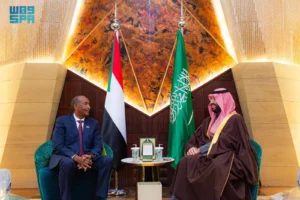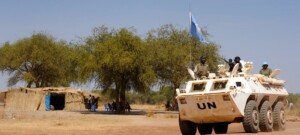Khartoum to Darfur – a road trip of rediscovery for Radio Dabanga
Last month, a delegation from Radio Dabanga, led by editor-in-chief Kamal El Sadig, visited Sudan and Darfur for the first time since the radio station was founded in exile 11 years ago.
 Radio Dabanga editor-in-chief is welcomed at his hometown of Um Kedada in North Darfur after 11 years in exile
Radio Dabanga editor-in-chief is welcomed at his hometown of Um Kedada in North Darfur after 11 years in exile
Last month, a delegation from Radio Dabanga, led by editor-in-chief Kamal El Sadig, visited Sudan and Darfur for the first time since the radio station was founded in exile 11 years ago.
Radio Dabanga was prevented from operating freely and openly in Sudan while the deposed Al Bashir regime was in power, and was founded in exile in Amsterdam, facilitated by the Netherlands-based NGO Free Press Unlimited, and has enjoyed the benefits of the freedom of expression and the press enshrined in Dutch law.
It has taken the changes brought about in the aftermath of the December 2018 revolution that has allowed Radio Dabanga’s editor-in-chief to cautiously venture back into his native country.
When Kamal fled Al Bashir’s press curbs to self-imposed exile in Amsterdam over a decade ago, the road for the Sudanese capital Khartoum and the North Darfur capital of El Fasher was unpaved and very poor.
“I was interested to see how transport has improved, now that there are new asphalt roads,” Kamal explains. “11 years ago, it took three days by lorry to travel from Khartoum to my home district of Um Kedada in North Darfur, south-east of the state capital of El Fasher.

“We’d have to board at Omdurman. The lorries were heavily loaded with goods and passengers, and had to travel an arduous desert road.
‘Our journey of more than 900 kilometres still took more than 12 hours by road, but the new asphalt roads have certainly shortened the distance’
“This time, our journey of more than 900 kilometres still took more than 12 hours by road, but the new asphalt roads have certainly shortened the distance. Our route took us via Barah to El Obeid in North Kordofan, where we joined the B26 toward En Nahud and the B20 to Um Kedada,” he says.
“There were also no check points along the road with searches and examination as was the case in the past under the Al Bashir regime. There is a security presence, but we were driving a small car and we were allowed to pass without being stopped.
“The road is lined with cafes, life, activity, and transit cars as we headed into the afternoon. It was really becoming a voyage of rediscovery as we connected with people along the road, and it began to hit home how well known, trusted, and respected Radio Dabanga has become.”

“That aspect was amazing, almost unbelievable,” Kamal says. “For example, we stopped for coffee along on the road between Barah and El Obeid. A man came over to us who had overheard that we were from Radio Dabanga. He was delighted to meet us, shook out hands, and treated us like celebrities. He left before us, but when the time came for us to pay for the coffee, we were told we he had already paid.”

Um Kedada
Kamal says that more surprises were to await them as they approached his hometown in North Darfur. “On the outskirts of Um Kedada, as we came around the mountains a few kilometres from the city, we encountered a crowd of hundreds of people waiting to welcome us. Youth and women’s organisations, the Forces for Freedom and Change, the Sudanese Professionals Association and resident committees were all represented.”

Kamal says it was reminiscent of the welcome the Radio Dabanga delegation had received when they landed in Khartoum a few days earlier. “This was humbling, and extremely motivating.
‘As we approached Um Kedada, leaders and dignitaries of the community were receiving us with banners, many of them pictures of Radio Dabanga. The procession extended all the way into the town’
“Now, as we approached Um Kedada, leaders and dignitaries of the community were receiving us with banners, many of them pictures of Radio Dabanga. The procession extended all the way into the town, where thousands joined them in a scene that reflected the people’s solidarity with Radio Dabanga, and what Dabanga Radio means to the people of Darfur and Sudan today.”
According to Dr Rashid Juma, coordinator of the Forces for Freedom and Change in North Darfur, the welcome reception during which Kamal was carried shoulder-high by the crowd, was “to show the extent of appreciation and love in return for the pioneering role that Radio Dabanga played over the past years."
When Kamal visited the schools in Um Kedada, the welcome was equally enthusiastic with teachers and students chanting slogans for Radio Dabanga, peace, and justice (see video above).







on his first return to Um Kedada in 11 years
El Fasher
“We then headed for El Fasher, which is about 157 kilometres north-west of Un Kedada. Again the road was paved, which it wasn’t 11 years ago, and was clear of check points allowing us to travel without delays. The city of El Fasher was bustling with traffic and people and its roads were crowded with cars, mostly without licence plates.

“We did not stop in El Fasher, so we crossed the city in transit. We were careful to keep a low profile because our time was very limited, and we had an appointment with one of the heroes of Radio Dabanga Hassan Arbab near Zamzam camp for the displaced south of El Fasher.
“Hassan met us near Zamzam and guided us through the vast camp for internally displaced people to the home where his wife and three children were waiting. This was an emotional moment because it was the first time he was reunited with his family since the fall of the Al Bashir regime in April 2019.”
In the afternoon, Kamal headed southwards from El Fasher towards Nyala, capital of South Darfur, which is Darfur’s largest city, more than 200 kilometres away.
Manawashi
“The road to Nyala was a difficult one, and wasn’t paved,” says Kamal, “so it was getting dark by the time we reached Manawashi in Mershing locality. From there on, the road was paved, so we drove through the rest of the evening to Nyala.”
The South Darfur capital is second only to Khartoum in terms of population, importance, and national income. “It has really expanded since I was last here, and is also crowded with vehicles without licence plates. Sirens blare as loudly as they do in Khartoum. It’s a city that never sleeps. By now, we had covered almost 1,300 kilometres since leaving Khartoum.

‘This trip to Darfur has allowed us to, more than just literally, explore the new road, and I feel a very strong and bright future for Radio Dabanga’
“This was, of course, our first return after 11 years and it was a very time-limited voyage of rediscovery and reconnaissance. I had to see things for myself and I was very surprised and heartened. The response by the public and community leaders wherever we went was overwhelming. Peace is high on the agenda of everyone we met, in Sudan in general, and in Darfur in particular.
“We could not spend as much time meeting people as we would have liked, but there will certainly be future visits. It was one of the demands of the Heroes of Radio Dabanga who we honoured at a celebration at the National Museum of Sudan in Khartoum. They told us that it is important that we meet up with them in the camps of Darfur and in the other cities of the region.
“That is why this trip to Darfur has allowed us to, more than just literally, explore the new road, and I feel a very strong and bright future for Radio Dabanga,” he concludes.

Radio Dabanga editor-in-chief Kamal El Sadig in Zamzam camp
Radio Dabanga’s editorial independence means that we can continue to provide factual updates about political developments to Sudanese and international actors, educate people about how to avoid outbreaks of infectious diseases, and provide a window to the world for those in all corners of Sudan. Support Radio Dabanga for as little as €2.50, the equivalent of a cup of coffee.












 and then
and then